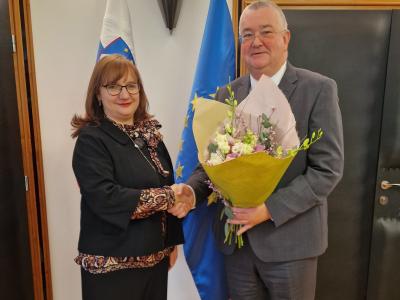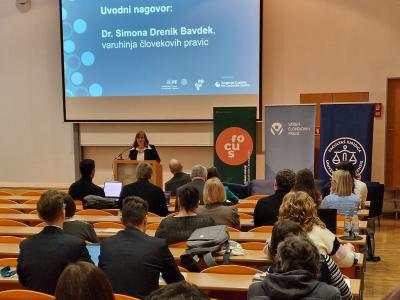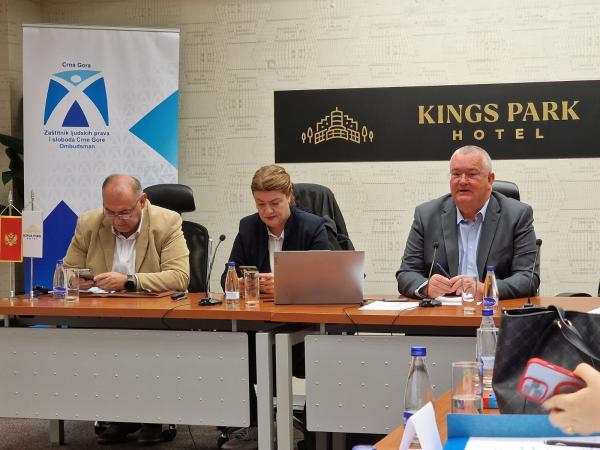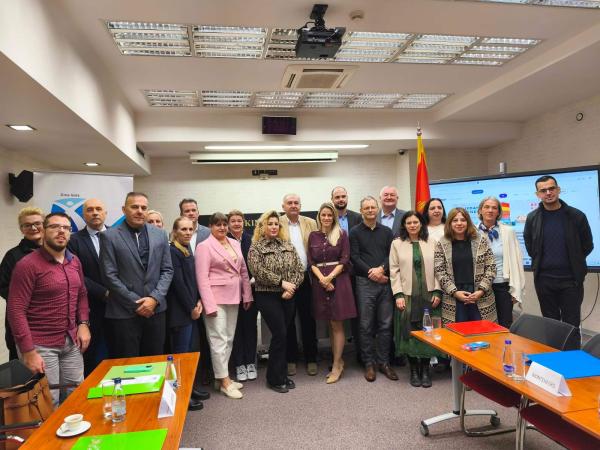SEE NPM Network meeting in Montenegro on forced hospitalisation in (pre)criminal and civil proceedings
The SEE NPM Network met in Podgorica, Montenegro, on 5 and 6 November 2025. The focus of the meeting of the network members was on the findings of the NPMs in individual countries regarding involuntary hospitalisation in (pre)criminal and civil proceedings. The event was organised by the Ombudsman for Human Rights and Freedoms of Montenegro and took place within the framework of the chairmanship of the network by the Slovenian NPM
The Deputy Ombudsman and Head of the Slovenian State Police, Ivan Šelih, and member of the Slovenian State Police, Mag. Jure Markič, presented to the meeting participants the specifics of the Slovenian regulation of involuntary hospitalisation in (pre)criminal proceedings and detention in the so-called closed ward of a psychiatric hospital or social welfare institution based on the provisions of the Mental Health Act. Deputy Šelih specifically highlighted the problems that arise due to difficulties in placing patients of the Forensic Psychiatry Unit after the expiry of the security measure, mainly due to the overcrowding of the secure wards of special social welfare institutions and the question of the suitability of these institutions to accept such a person in one of their secure wards. Presenting the civil procedures for detaining an individual in a secure ward of a social welfare institution, Mag. Markič pointed out, among other things, the lack of an appropriate legal basis for placing residents in wards of nursing homes, which de facto meet the definition of a secure ward, although they are not physically locked, and the protection of residents is carried out in a different way. He also mentioned the issue of restricting the use of mobile phones in wards under special supervision within psychiatric hospitals. Above all, he pointed out the controversial practice in use at some psychiatric hospitals, which in individual cases, by prolonging the physical restraint of a patient with belts, result in the patient being restrained for several days in a row with minimal interruptions or even without them.
The presentations had a great impact on the other participants of the meeting and had a strong influence on the adoption of the conclusions of the meeting. Among them was the warning that any form of forced hospitalisation should only be used as a measure of last resort, after an individual assessment and based on a decision by a competent, independent judicial authority. All decisions must be based on clear medical and legal criteria, be subject to regular supervision, and offer the possibility for immediate access to appeal.
Persons who have been forcibly hospitalised must be provided with independent legal advice, free of charge when necessary, and informed in an accessible manner of their rights and the reasons for their detention. Judicial proceedings must be prompt, impartial, and transparent.
State authorities must ensure that sufficient numbers of qualified and continuously trained professionals, including psychiatrists, psychologists, nurses, and social workers, are trained in human rights standards, de-escalation techniques and non-coercive approaches to treatment.
The treatment environment must respect inherent dignity and autonomy. Any derogation from autonomy must be based on law and only apply in clearly and strictly defined exceptional circumstances.
Public authorities should develop and adequately fund community-based mental health and social support services to ensure continuity of care after discharge. No person should be involuntarily hospitalised when the medical reasons for hospitalisation cease to exist solely because alternative accommodation or support in the community is not available. This constitutes a violation of the right to liberty and may amount to inhuman or degrading treatment.
Particular attention should also be paid to the protection of vulnerable groups, including women, children, and the elderly, whose specific needs and risks should be addressed through tailored protection measures and gender- and age-sensitive approaches.
The SEE NPM Network was established by the NPMs on 26 March 2013 in Belgrade. The purpose of the network is to strengthen cooperation in the region, exchange experiences, and organise various joint activities to achieve the most effective implementation of the NPM mandate as set out in the Optional Protocol to the Convention against Torture and Other Cruel, Inhuman or Degrading Treatment or Punishment.














 Back
Back 






